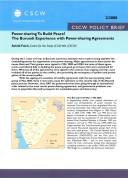During the 11-year civil war in Burundi, numerous attempts were made to bring together the contending parties for negotiations over power-sharing. Major agreements to share power between Hutu and Tutsi groups were signed in 1994, 2000 and 2004, but none of these agreements contributed fully to building the peace and good governance that were envisioned for them. Whereas all of the agreements were signed in the context of an ongoing civil war, none included all of the parties to the conflict, thus provoking the emergence of spoilers and prolongation of the armed conflict.
With the signing of a cessation of hostility agreement with the last remaining rebel group in May 2008, there is now some cause for optimism on the security side of the Burundi peace process. However, since 2007 the government has been going through an institutional crisis related to the most recent power-sharing agreement, and governance problems continue to jeopardize Burundi’s prospects for sustainable peace and democracy.








